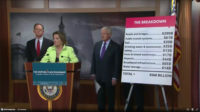Construction contractor groups welcomed House Republicans' newly unveiled principles for developing immigration legislation—an important issue for construction companies and workers—but organized labor sharply criticized the GOP outline.
The set of six principles, released on Jan. 30 at a House Republican retreat in Cambridge, Md., would allow children of illegal immigrants “an opportunity for legal residence and citizenship,” but make clear that the party would not include a “path to citizenship” for those who entered the U.S. illegally.
Geoff Burr, Associated Builders and Contractors vice president of government affairs, called the House Republicans’ outline an “important step toward fixing our broken immigration system in the United States.”
Stephen Sandherr, Associated General Contractors of America CEO, said, “The fact that House Republicans have decided to make immigration reform a top priority for the year is a sign that they appreciate the fact that addressing this issue is crucial to our overall economic vitality.”
But AFL-CIO President Richard Trumka slammed the House GOP framework as “a flimsy document” and criticized it for omitting a “pathway to citizenship.” Trumka said, "A road map to citizenship is vital to protecting working families' rights and keeping families together."
The new House GOP framework is only a preliminary step. It next would have to be translated into a detailed legislative proposal‑or perhaps a set of proposals.
Committee and floor action would have to follow and then negotiations with the Senate, which passed a comprehensive immigration bill last June. Lawmakers also would have to accomplish all that in a legislative year that will be truncated because of campaigning for the Nov. 4 elections.
The wide-ranging 2013 Senate immigration bill includes a process—though a lengthy one—for illegal immigrants to become U.S. citizens.
House Speaker John Boehner (R-Ohio) previously has made clear that the chamber would not take up the Senate bill. Speaking to reporters Jan. 30, Boehner reiterated his 2013 statements that the House GOP would pursue immigration reform in a “common sense, step-by-step” way.
Sen. Charles Schumer (D-N.Y.), a key architect of the Senate bill, said that although the House GOP principles “are certainly not everything we would agree with, they leave a real possibility that Democrats and Republicans, in both the House and Senate, can in some way come together and pass immigration reform that both sides can accept.”
Schumer added, “It is a long, hard road but the door is open.”
A key construction provision in the Senate bill would establish a new “W visa” for guest workers in construction and other industries. The bill would cap nationwide construction W visas at 15,000 annually. Unions strongly support the cap but construction contractor organizations forcefully oppose it.
The House framework has no mention of construction. But it states, “The goal of any temporary worker program should be to address the needs of the country and to strengthen our national security by allowing for realistic, enforceable, usable legal paths for entry into the United States.” The document adds, “Of particular concern are the needs of the agricultural industry, among others.”
Sandherr said AGC would “work aggressively to ensure that any final measure provides sufficient opportunity for construction workers to enter into the domestic workforce, especially in areas of the country where firms are having a hard time finding enough qualified workers to fill positions.”
The House GOP framework also states that border security and enforcement measures “must come first” in an immigration program. Other elements include “a workable electronic employment verification system” and a system to track entry and exit visas.


